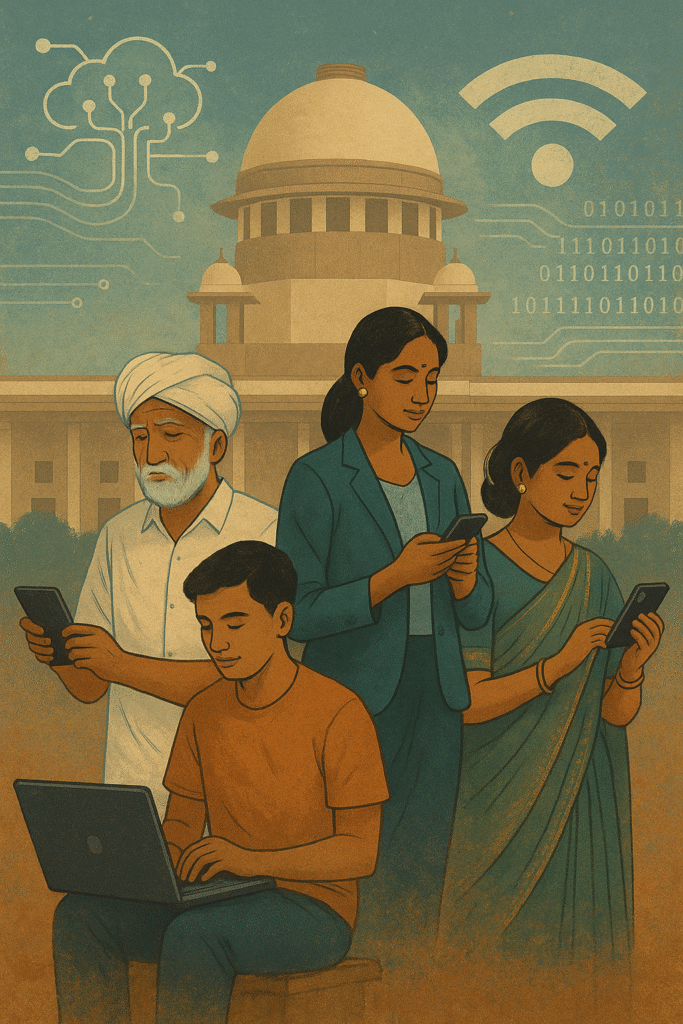In a historic ruling on April 30, 2025, the Supreme Court of India declared digital access a fundamental right under Article 21, paving the way for a more inclusive digital environment. The judgment directed a comprehensive overhaul of the e-KYC (electronic Know Your Customer) process to ensure accessibility for persons with disabilities—especially acid attack survivors and visually impaired individuals.

Digital Access a Fundamental Right-Key Highlights
Digital Access = Right to Life: The Court held that access to digital infrastructure is essential to the right to life and liberty.
20 Clear Directives: A bench of Justices J.B. Pardiwala and R. Mahadevan issued 20 directions to make the e-KYC process inclusive for persons with disabilities.
Real-Life Cases Trigger Reform: A petition by an acid attack survivor who couldn’t complete KYC due to the requirement of “blinking for live photo” moved the Court to act.
Backed by the Constitution: The Court emphasized the need to uphold Articles 14 (equality), 15 (non-discrimination), and 38 (social justice).
What It Means for the Differently Abled
Barrier-Free Access: The ruling ensures that individuals with disabilities can access banking, healthcare, and digital services without being excluded by tech.
No One-Size-Fits-All Biometrics: Alternative verification methods must be offered—blinking, facial scans, or thumbprints alone are no longer acceptable as universal standards.
Universal Digital Design: The decision promotes accessible infrastructure, nudging India closer to true digital inclusion.
Next Steps & Institutional Duty
Updated KYC Guidelines: Banks and service providers must revise processes to meet accessibility needs.
Training & Sensitization: Institutions need to train staff to implement inclusive e-verification procedures.
Regulatory Oversight: Enforcement of these directions is key to preventing further exclusion and protecting fundamental rights.
Towards a More Equitable Digital India
This verdict reaffirms that inclusion is not a privilege—it’s a right. By making digital KYC accessible, the Supreme Court has taken a transformative step toward empowering all citizens, especially those historically excluded from digital systems. It’s not just a legal win—it’s a win for human dignity and equality.
Digital Access as a Fundamental Right: What This Means for India’s Digital Future
The recognition of digital access as a fundamental right means that internet connectivity is now protected under Article 21 of the Constitution, which guarantees the right to life and personal liberty. This move aligns India with progressive global jurisprudence, where digital inclusion is seen as essential for exercising other rights like education, expression, and employment.
In practical terms, the ruling mandates the government to ensure equitable digital infrastructure across urban and rural areas. It may also lead to legal scrutiny of internet shutdowns, the digital divide in education, and accessibility challenges for marginalized communities. Lawyers, civil society organizations, and policymakers now have stronger legal footing to demand uninterrupted and affordable internet access for all.
Future Implications and Judicial Oversight
The recognition of digital access as a fundamental right also opens the door for greater judicial oversight over policies like internet shutdowns, algorithmic bias in public service delivery, and the digital authentication of welfare services. Courts may now be called upon to review whether any government action unjustifiably restricts access to digital platforms essential for education, healthcare, employment, and governance. This judicial recognition is not just symbolic—it has the potential to reshape how India upholds democratic participation in the digital era.
References
The recognition of digital access as a fundamental right underscores the evolving nature of digital inclusion in India. However, the extension of these rights often raises complex legal questions, such as balancing access with accountability. A recent case, J.O. vs Internet Platform, explores these challenges in the context of content removal and digital responsibility. Click here to read more about this ongoing debate.
If you want to talk to us, just fill in the form by clicking here.


One Response